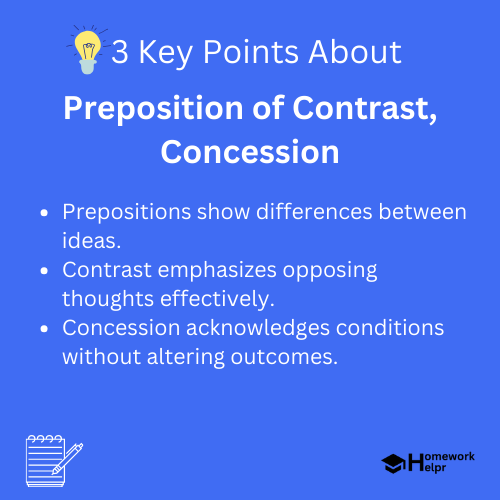📝 Summary
In the study of language, prepositions of contrast and concession play a significant role in expressing differences and exceptions. Prepositions of contrast, such as although and despite, highlight disparities between ideas, while prepositions of concession, like even though and in spite of, allow for stating truths despite potential contradictions. Mastering these prepositions enhances communication by providing clarity and depth, enabling more nuanced expressions in speech and writing. Regular practice with these tools leads to improved communication skills and better conveyance of ideas.
Understanding Prepositions of Contrast and Concession
Language is made up of many components, and one of the crucial elements is prepositions. Among the different types of prepositions, the prepositions of contrast and concession are particularly interesting. They help us express ideas that highlight differences and exceptions. In this article, we will explore the definitions, examples, and usage of these important linguistic tools.
What are Prepositions of Contrast?
Prepositions of contrast are used to show the differences between two ideas or statements. These prepositions connect clauses that express opposing thoughts. The right use of these prepositions helps to convey a clear understanding of the relationship between the ideas.
Some common prepositions of contrast include:
- Although
- Despite
- Whereas
- On the other hand
Examples
For instance, consider the sentences “I enjoy swimming despite the cold water” and “John is quite tall whereas his brother is short.”
Definition
Convey: To communicate or express something. Linguistic:** Relating to language or linguistics.
Using ‘Although’ and ‘Though’
The words ‘although’ and ‘though’ are often used at the beginning of a sentence to indicate contrast. These prepositions imply that the second statement will counter the first.
For example:
- Although it was raining, we went for a picnic.
- I was tired, though I decided to finish my homework.
Here, the use of these prepositions clearly shows that we are acknowledging a potential issue (such as rain or tiredness) but are still proceeding with our plan or action.
Understanding Prepositions of Concession
On the other hand, prepositions of concession are used to indicate that something is true, even though there are reasons to think otherwise. They allow the speaker to present an idea that somewhat contradicts the common belief or expectation.
Common prepositions of concession include:
- Even though
- In spite of
- Regardless of
Examples
Say you hear, “I finished my essay even though I had a lot of distractions,” this shows that the person was able to overcome challenges to achieve a goal.
Definition
Contradict: To assert the opposite of a statement or idea. Expectation: A belief that something will happen in the future.
Examples of Prepositions of Concession
To grasp the use of prepositions of concession, consider the following examples:
- In spite of the harsh weather, the marathon continued.
- Regardless of the poor reviews, the movie became a box office hit.
These examples demonstrate that circumstances or expectations do not always change outcomes, highlighting the significance of perseverance and determination in achieving goals.
Contrasting with ‘But’ and ‘Yet’
It is also essential to recognize how prepositions of contrast and concession often intertwine with ‘but’ and ‘yet’. These conjunctions also denote contrast.
- She was upset, but she smiled anyway.
- It was late, yet he continued to work.
Using these structures, you can provide a stronger connection between clauses. They serve to imply an unexpected or surprising outcome in a situation.
Key Differences Between Contrast and Concession
While both prepositions of contrast and concession are essential for expressing differences, they have distinct functions.
- Prepositions of Contrast: Highlight disparities between two ideas.
- Prepositions of Concession: Acknowledge a condition that could undermine the primary statement but does not alter the outcome.
❓Did You Know?
Did you know that understanding prepositions can significantly enhance your writing? They add clarity and depth to your sentences!
Practical Applications of Prepositions of Contrast and Concession
In practical terms, knowing how to use prepositions of contrast and concession improves communication. For example, in writing essays, speeches, or even conversations, these prepositions allow you to present a more nuanced argument.
Imagine you are writing an essay about school uniforms:
- Although some argue they limit student expression, many believe that uniforms promote equality among students.
- Even though uniforms can be expensive, parents appreciate the time saved on selecting outfits.
These examples not only convey contrasting ideas but also facilitate a more comprehensive understanding of the subject matter.
Conclusion
In conclusion, the use of prepositions of contrast and concession plays a vital role in language. By mastering these tools, you can enhance your writing and speaking skills, making your communication more effective and engaging. Remember to practice using these prepositions in various contexts to fully grasp their meanings and applications. The more you understand these nuances, the better equipped you will be to convey your thoughts as accurately as possible.

Related Questions on Preposition of Contrast, Concession
What are prepositions of contrast?
Answer: They show differences between two ideas.
What is the function of concession prepositions?
Answer: They acknowledge conditions that might undermine statements.
Can you give examples of concession prepositions?
Answer: Examples include “even though” and “in spite of.”
How do these prepositions enhance communication?
Answer: They add clarity and depth to expressions.
